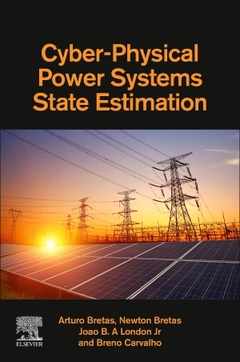Cyber-Physical Power Systems State Estimation
Auteurs : Bretas Arturo, Bretas Newton, London Jr Joao B.A., Carvalho Breno

Cyber-Physical Power System State Estimation updates classic state estimation tools to enable real-time operations and optimize reliability in modern electric power systems. The work introduces and contextualizes the core concepts and classic approaches to state estimation modeling. It builds on these classic approaches with a suite of data-driven models and non-synchronized measurement tools to reflect current measurement trends required by increasingly more sophisticated grids. Chapters outline core definitions, concepts and the network analysis procedures involved in the real-time operation of EPS.
Specific sections introduce power flow problem in EPS, highlighting network component modeling and power flow equations for state estimation before addressing quasi static state estimation in electrical power systems using Weighted Least Squares (WLS) classical and alternatives formulations. Particularities of the state estimation process in distribution systems are also considered. Finally, the work goes on to address observability analysis, measurement redundancy and the processing of gross errors through the analysis of WLS static state estimator residuals.
1. Introduction to Cyber-Physical Power Systems State Estimation 2. Real-Time Operation of Power Systems 3. Power Flow in Electric Power Systems 4. Quasi Static State Estimation in Electric Power Systems 5. Qualitative Characteristics of Measurement Sets 6. Gross Errors Processing in Measurements 7. Methodology for Error Processing based on the Innovation Index 8. Data driven state estimation solutions 9. Dynamic State Estimation
Newton Bretas received the B.Sc. from the Federal University of Minas Gerais in 1970 and M.Sc. degrees from the University of Campinas in 1975. In 1981 he received a PhD degree from the University of Missouri. He is currently a Full Professor with the Department of Electrical and Computer Engineering, University of Sao Paulo, Sao Carlos, SP, Brazil. His research interests include power systems state estimation, nonlinear controls and reliability optimization.
Joao Bosco London Junior received the B.Sc. and M.Sc. degrees in Electrical Engineering from the Federal University of Mato Grosso and University of Sao Paulo, in 1993 and 1997, respectively. In 2000 he received the Ph.D. degree from the University of Sao Paulo. He is currently an Associate Professor with the Department of Electrical and Computer Engineering, University of Sao Paulo, Sao Carlos, SP, Brazil. His research interests include power systems state estimation and reliability optimization.
Breno E. B. Carvalho received the B.S. degree from the Federal University of Viçosa, Viçosa-MG, Brazil, in 2011, the M.Sc. and the D.Sc. degrees from EESC-University of São Paulo, São Carlos-SP, Brazil, in 2013 and 2018, respectively, both in electrical engineering. He worked as a research intern at the ECE Power Lab, University of Florida, Gainesville-FL, USA, in 2015-2016. He has been a Faculty member with the Department of Electrical Engineering, SATC University Center, Criciúma-SC, Brazil, since 2018, where he is currently a Full Time Professor. He has gradua
- Develops advanced approaches to smart grid real-time monitoring through quasi-static model state estimation and non-synchronized measurements system models
- Presents a novel, extended optimization, physics-based model which identifies and corrects for measurement error presently egregiously discounted in classic models
- Demonstrates how to embed cyber-physical security into smart grids for real-time monitoring
- Introduces new approaches to calculate power flow in distribution systems and for estimating distribution system states
- Incorporates machine-learning based approaches to complement the state estimation process, including pattern recognition-based solutions, principal component analysis and support vector machines
Date de parution : 05-2021
Ouvrage de 292 p.
15.2x22.8 cm


